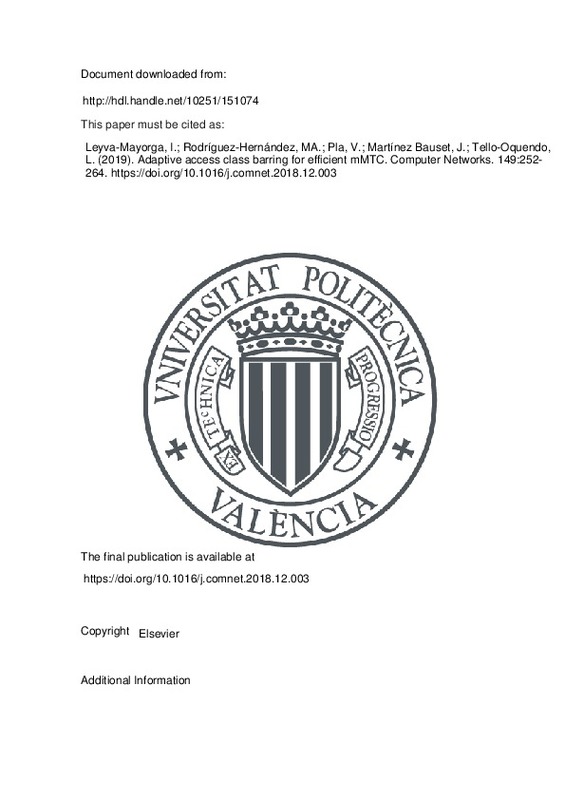JavaScript is disabled for your browser. Some features of this site may not work without it.
Buscar en RiuNet
Listar
Mi cuenta
Estadísticas
Ayuda RiuNet
Admin. UPV
Adaptive access class barring for efficient mMTC
Mostrar el registro sencillo del ítem
Ficheros en el ítem
| dc.contributor.author | Leyva-Mayorga, Israel
|
es_ES |
| dc.contributor.author | Rodríguez-Hernández, Miguel A.
|
es_ES |
| dc.contributor.author | Pla, Vicent
|
es_ES |
| dc.contributor.author | Martínez Bauset, Jorge
|
es_ES |
| dc.contributor.author | Tello-Oquendo, Luis
|
es_ES |
| dc.date.accessioned | 2020-10-05T06:42:45Z | |
| dc.date.available | 2020-10-05T06:42:45Z | |
| dc.date.issued | 2019-02-11 | es_ES |
| dc.identifier.issn | 1389-1286 | es_ES |
| dc.identifier.uri | http://hdl.handle.net/10251/151074 | |
| dc.description.abstract | [EN] In massive machine-type communications (mMTC), an immense number of wireless devices communicate autonomously to provide users with ubiquitous access to information and services. The current 4G LTE-A cellular system and its Internet of Things (IoT) implementation, the narrowband IoT (NB-IoT), present appealing options for the interconnection of these wireless devices. However, severe congestion may arise whenever a massive number of highly-synchronized access requests occur. Consequently, access control schemes, such as the access class barring (ACB), have become a major research topic. In the latter, the precise selection of the barring parameters in a real-time fashion is needed to maximize performance, but is hindered by numerous characteristics and limitations of the current cellular systems. In this paper, we present a novel ACB configuration (ACBC) scheme that can be directly implemented at the cellular base stations. In our ACBC scheme, we calculate the ratio of idle to total available resources, which then serves as the input to an adaptive filtering algorithm. The main objective of the latter is to enhance the selection of the barring parameters by reducing the effect of the inherent randomness of the system. Results show that our ACBC scheme greatly enhances the performance of the system during periods of high congestion. In addition, the increase in the access delay during periods of light traffic load is minimal. | es_ES |
| dc.description.sponsorship | This research has been supported in part by the Ministry of Economy and Competitiveness of Spain under Grant TIN2013-47272-C2-1-R and Grant TEC2015-71932-REDT. The research of I. Leyva-Mayorga was partially funded by grant 383936 CONACYT-GEM 2014. | es_ES |
| dc.language | Inglés | es_ES |
| dc.publisher | Elsevier | es_ES |
| dc.relation.ispartof | Computer Networks | es_ES |
| dc.rights | Reserva de todos los derechos | es_ES |
| dc.subject | Access class barring (ACB) | es_ES |
| dc.subject | Adaptive filters | es_ES |
| dc.subject | Internet of Things (IoT) | es_ES |
| dc.subject | LTE-A | es_ES |
| dc.subject | Massive machine-type communications (mMTC) | es_ES |
| dc.subject.classification | TEORIA DE LA SEÑAL Y COMUNICACIONES | es_ES |
| dc.subject.classification | INGENIERIA TELEMATICA | es_ES |
| dc.title | Adaptive access class barring for efficient mMTC | es_ES |
| dc.type | Artículo | es_ES |
| dc.identifier.doi | 10.1016/j.comnet.2018.12.003 | es_ES |
| dc.relation.projectID | info:eu-repo/grantAgreement/MINECO//TEC2015-71932-REDT/ES/ELASTIC NETWORKS: NUEVOS PARADIGMAS DE REDES ELASTICAS PARA UN MUNDO RADICALMENTE BASADO EN CLOUD Y FOG COMPUTING/ | es_ES |
| dc.relation.projectID | info:eu-repo/grantAgreement/CONACyT//383936/ | es_ES |
| dc.relation.projectID | info:eu-repo/grantAgreement/MINECO//TIN2013-47272-C2-1-R/ES/PLATAFORMA DE SERVICIOS PARA CIUDADES INTELIGENTES CON REDES M2M DENSAS/ | es_ES |
| dc.relation.projectID | info:eu-repo/grantAgreement/AEI/Plan Estatal de Investigación Científica y Técnica y de Innovación 2017-2020/PGC2018-094151-B-I00/ES/SLICING DINAMICO EN REDES DE ACCESO RADIO 5G/ | es_ES |
| dc.rights.accessRights | Abierto | es_ES |
| dc.contributor.affiliation | Universitat Politècnica de València. Departamento de Comunicaciones - Departament de Comunicacions | es_ES |
| dc.description.bibliographicCitation | Leyva-Mayorga, I.; Rodríguez-Hernández, MA.; Pla, V.; Martínez Bauset, J.; Tello-Oquendo, L. (2019). Adaptive access class barring for efficient mMTC. Computer Networks. 149:252-264. https://doi.org/10.1016/j.comnet.2018.12.003 | es_ES |
| dc.description.accrualMethod | S | es_ES |
| dc.relation.publisherversion | https://doi.org/10.1016/j.comnet.2018.12.003 | es_ES |
| dc.description.upvformatpinicio | 252 | es_ES |
| dc.description.upvformatpfin | 264 | es_ES |
| dc.type.version | info:eu-repo/semantics/publishedVersion | es_ES |
| dc.description.volume | 149 | es_ES |
| dc.relation.pasarela | S\374483 | es_ES |
| dc.contributor.funder | Agencia Estatal de Investigación | es_ES |
| dc.contributor.funder | Ministerio de Economía y Empresa | es_ES |
| dc.contributor.funder | Ministerio de Economía y Competitividad | es_ES |
| dc.contributor.funder | Consejo Nacional de Ciencia y Tecnología, México | es_ES |







![[Cerrado]](/themes/UPV/images/candado.png)

